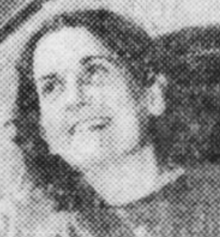Ruth Davidow
Ruth Davidow | |
|---|---|
 Ruth Davidow, from a 1939 newspaper | |
| Born | September 11, 1911 Volkavisk, Russia |
| Died | June 28, 1999 San Francisco, California, US |
| Occupation(s) | Nurse, filmmaker, activist |
Ruth Rebecca Davidow (September 11, 1911 – June 28, 1999) was an American nurse, filmmaker, and political activist.
Early life and family[edit]
Born in Volkovisk, Russian Empire on September 11, 1911,[1] Davidow grew up in New York City after her mother, a Jewish socialist, fled tsarist Russia in 1917.[2] Her mother's politics were formative for Davidow. Her mother was a seamstress and became a leader in the International Ladies Garment Workers Union and sold The Daily Worker, a communist newspaper, door-to-door.[2] When her father developed tuberculosis, Davidow gave up aspirations of becoming a lawyer and enrolled in nursing school at the Brooklyn Jewish Hospital to help provide for the family. She also found this a politicizing experience, both in caring for the poor and in unionization efforts at the hospital.[2]
Davidow married Fred Keller and they had one daughter, Joanie Keller Selznick.[1][3]
Career[edit]
When the Spanish Civil War began in 1936, Davidow volunteered to go in support of the Spanish Republic against the fascists as a nurse with the medical staff of the Abraham Lincoln Brigade, the American volunteer unit.[1] This was in defiance of a travel ban from Franklin D. Roosevelt's then-isolationist administration.[2] She worked at a hospital on the front lines during the 1938 Ebro offensive.[1] In 1939 she toured in the United States with another American nurse, Evelyn Hutchins Rahman, talking about their experiences in Spain.[4]
She later moved to Cuba, serving as an aid worker from 1960 to 1962 following the revolution.[3] She also worked in the American South in 1965 supporting the civil rights movement as part of the Medical Committee for Human Rights.[3] During the Native American occupation of Alcatraz (1969 to 1971), Davidow was one of the only non-Native Americans allowed onto the island, providing medical care.[3]
In the 1980s, Davidow founded a clinic in San Francisco's Haight-Ashbury district to offer care to drug addicts.[2]
Encouraged by her daughter, a filmmaker, Davidow also began making films as a form of activism in the 1980s.[5] Her 21 films deal with a variety of topics in politics, health, and geriatrics.[3]
Honors and legacy[edit]
In 1996, the Spanish government awarded Davidow honorary citizenship for her nursing service during the civil war.[3] She was profiled in the 1991 Academy Award-nominated documentary Forever Activists: Stories From the Veterans of the Abraham Lincoln Brigade by Judith Montell.[5]
Death[edit]
Davidow died on June 28, 1999, in San Francisco.[1]
References[edit]
- ^ a b c d e "Davidow, Ruth (1911–1999)." Dictionary of Women Worldwide: 25,000 Women Through the Ages, edited by Anne Commire and Deborah Klezmer, vol. 1, Yorkin Publications, 2007, p. 483. Gale eBooks. Accessed 11 Oct. 2021.
- ^ a b c d e Goldfine, Jael (August 20, 2018). "Meet The Radical Nurse Who Joined The Spanish Civil War". The Forward. Retrieved 2021-10-12.
- ^ a b c d e f Delgado, Ray (1999-07-03). "Ruth Davidow". SFGATE. Retrieved 2021-10-12.
- ^ "Women from Spanish War Will Speak Here". The Tampa Tribune. 1939-01-25. p. 7. Retrieved 2021-10-12 – via Newspapers.com.
- ^ a b "Obituaries". Los Angeles Times. 1999-07-17. Retrieved 2021-10-12.
This article needs additional or more specific categories. (October 2021) |
